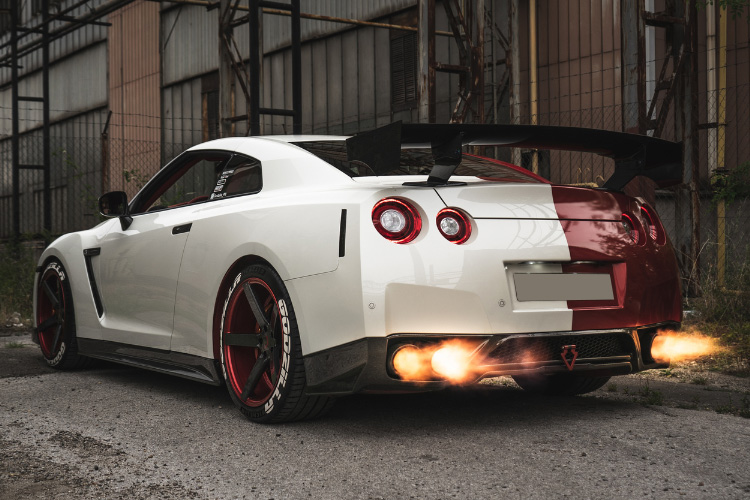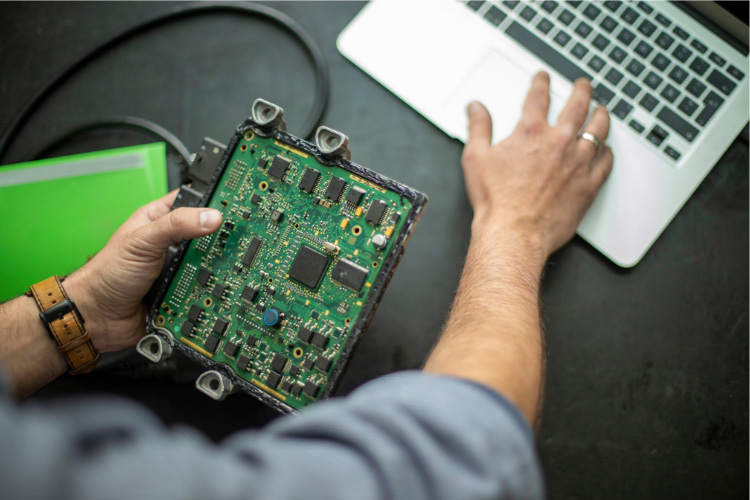Are you looking to get more performance out of your car? If so, you’ve no doubt heard about ECU tuning.
ECU tuning is a very popular modification which can be an easy way to get extra power from your motor. However, there are a lot of questions that come up regarding ECU tuning, especially on stock ECUs.
In this post, we will give you everything you need to know regarding tuning stock ECUs.
So, Can You Tune a Stock ECU?
Yes you can. Practically all stock ECUs can be tuned using either one of two methods:
1. ECU Flashing
ECU Flashing is a modern method of tuning that involves updating the software or “map” on the ECU through the car’s OBD port.
This new software can adjust various parameters such as fuel/air mixture, ignition timing and boost pressure to increase the car’s performance.
The major advantage of ECU flashing is that it’s quick, easy and reversible – you can return the ECU to its original settings if needed. This method can be done on cars which have OBD ports, which are typically from 1995 and newer.
2. Socketing Or Chipping
The other more traditional method of ECU tuning, commonly used on older vehicles without OBD ports is called chipping or socketing.
This process typically involves the ECU being physically opened and either replacing the chip, or in some cases installing a socket to allow a new EPROM chip to be added. The new chip contains the modified maps to improve the car’s performance.
This method is more complicated than ECU flashing but is the only real method possible on older ECUs. It’s also a more labour-intensive process and, if not done correctly, can risk damaging the ECU.
However, this method is only typically required on cars older than 1995 that don’t have OBD ports.
Why Would You Want to Tune a Stock ECU?
There are several reasons why someone would want to tune a stock ECU.
The most obvious general answer is that it is often the quickest and easiest way to get performance gains from the car.
Installing a standalone ECU and getting the car dyno tuned is complicated and requires a lot of work, has the potential for running issues and other problems, and means the car is no longer in factory condition, which can void the warranty.
Tuning a stock ECU, on the other hand, can have the following benefits:
- Quick & Easy: Tuning a stock ECU is usually quick and easy, especially if a flash can be done. It also means you can use a preset map so the car does not have to be tuned on a dyno
- Cost Effective: Tuning a stock ECU is often once of the most cost effective performance upgrades you can do.
- Good Performance Improvement: Many stock ECUs have a range of aftermarket tune options which have proven performance benefits, meaning you won’t have to guess if doing the tune is going to be worth it. With a standalone ECU and custom tune, you can never be 100% sure what result you will get until it is done.
- Safety Of the Tune: If you use a tune from a reputable tuner, you can be confident that your car will not have any problems with the new tune.
- Engine Smoothness and Responsiveness: Stock ECUs often provide the smoothest and most responsive drivability from an engine, leading to a more satisfying and comfortable driving experience.
- Unlock Hidden Features: Some manufacturers lock certain features to make different versions of a car. With an ECU tune, these features can be unlocked, including speed limiter removal, launch control and more.
Is It Worth Tuning Your Stock ECU?
Whether tuning a stock ECU is “worth it” will greatly depend on the specific car in question as well as your goals.
Typically, with cars that are naturally aspirated, as well as older cars, there is often very little improvement that can be expected from an ECU tune, often somewhere in the range of 5-10hp.
However, with more modern cars, especially if they are turbo, power increases can be as high as 100hp from a good ECU tune.
So you really have to take into account your specific car and circumstances and see what the likely outcome is, in order to decide if the tune is worth doing.
There are also some potential downsides you should note:
- Potential Risk to Engine Longevity
While this is not a big risk if you use a tune from a reputable tuner, there is always a risk that any modification can cause problems or increase wear on your engine. You need to be sure that you are prepared for that possibility if it does occur. - Warranty Concerns: Tuning a stock ECU may void the vehicle’s warranty in some circumstances, so you should check with your car’s manufacturer before proceeding with any kind of ECU tuning.
- Cost: ECU tuning can be expensive, particularly for more advanced or custom tunes.
Will Tuning a Stock ECU Damage Your Engine?
It’s important to keep in mind that damage to an engine as a result of an ECU tune is fully dependent on the tune itself, not which ECU it is on.
With that being the case, a tuned stock ECU itself, with a tune that is done correctly (ideally by a reputable tuner) has very little risk of damaging your engine.
However, it’s important to keep in mind that any modification done to a car does increase the risk of something going wrong or being damaged, so always keep that risk in mind when you choose to install upgrades on your car.
If the ECU tuning is done incorrectly or excessively, no matter whether it is on a stock ECU or a standalone ECU, it can lead to engine damage over time.
Common issues with ECU tuning include:
- Over-Tuning
Tuning the engine to produce more power than the engine or other vehicle components can safely handle can result in excessive wear and even catastrophic failure of engine parts. For example, too much boost pressure on a turbocharged engine can cause premature turbo wear or even engine damage. - Improper Tuning
Even with less aggressive tuning, improper adjustments can lead to problems. For example, leaning out the fuel mixture too much can cause higher engine temperatures and potential damage. - Increased Stress on Components
Tuning that increases power output can put additional stress on various engine and drivetrain components, potentially leading to increased wear and a reduced lifespan.
This is why it is extremely important to have your ECU tuning done by a professional and use a tune from a reputable tuner such as APR or Dinan.
Will Tuning a Stock ECU Void Your Warranty?
It depends.
Typically, modifications can void specific parts of the warranty, but it greatly depends on the dealer/manufacturer and what modification was done.
In many cases, vehicle modifications are allowed without completely voiding the warranty. Typically, a dealer will need to prove that the modifications caused the damage before it can deny warranty coverage. However, this can vary from case to case.
Also, it’s worth noting that some dealerships are more tolerant of modifications than others. Some may overlook ECU tuning if it’s not causing any problems, while others may void the warranty at the first sign of any modifications.
Given the potential impact on warranty coverage, it’s generally a good idea to check with your dealer or review your warranty terms before getting an ECU tune.
Looking to Get Your ECU Tuned?
If you want to get your ECU tuned or would like to discuss your options for your car, contact us now by calling 09 441 3635 or emailing service@dodsonmotorsport.com.

 Looking for Dual Clutch transmission components outside of New Zealand?
Looking for Dual Clutch transmission components outside of New Zealand? 

